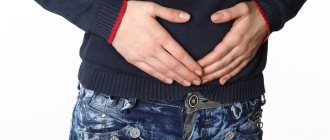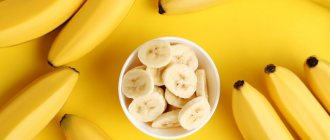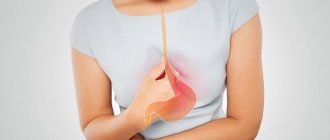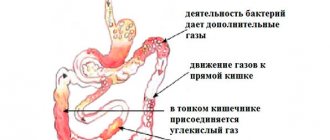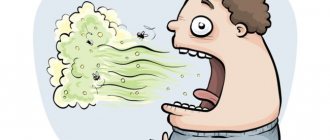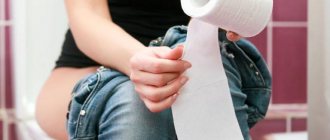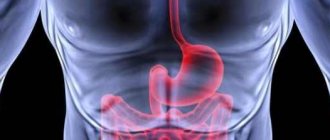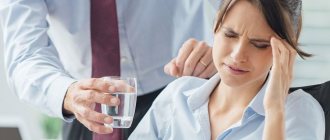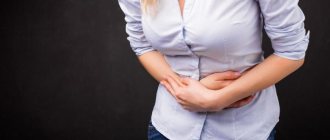Medicinal methods of eliminating gases in the intestines
Flatulence is a common occurrence. It usually occurs several hours after eating food. People who often encounter this problem are interested in how to remove gas from the stomach.
Modern treatment methods include drug therapy. Nowadays, pharmacological companies offer medications that effectively cope with the disease. They are divided into several types.
Sorbents
If a person does not know how to remove gases from the intestines, then you can take Activated Charcoal. This is one of the sorbent preparations. Their effect is aimed at absorbing oxygen bubbles and toxic components.
You should not take medications very often, since along with harmful bacteria they also remove beneficial ones. If you don’t have black coal on hand, you can use Smecta, Enterosgel, and White coal. The dosage is prescribed in the instructions based on age and weight.
Defoamers
If you need to quickly remove gas bubbles, you can use products from the defoaming group. Their effect is aimed at reducing the production of gases due to the presence of active substances in the form of dimethicone and simethicone.
This group includes the following drugs.
- Espumisan. A popular remedy that comes in the form of drops and tablets. It is intended for newborns, infants, older children and adults. It also relieves pain, colic and heaviness in the abdomen.
- SubSimplex. An excellent remedy for eliminating increased gas formation. The effect of the medication is aimed at the disintegration of the bubbles. Thus, the feeling of fullness and bloating is reduced. Available in the form of drops and allowed for babies from birth.
- Bobotik. Remedy for babies. It is not absorbed into the bloodstream, does not harm internal organs, and is safe. Prevents the processes of rotting and fermentation.
These products do not affect the state of the microflora and do not remove beneficial bacteria.
Prokinetics
You can remove gases with the help of prokinetics.
Such drugs stimulate the excretion of gases by activating the motor activity of the intestinal canal. The most popular include the following.
- Motilium. Eliminates dyspeptic symptoms such as nausea, vomiting, belching, bloating;
- Domperidrn. It copes well with the symptoms of flatulence. But before use, you should read the instructions, as the drug has many side effects. Do not use if you have kidney or liver disease;
- Passengers. The effect of the medication is aimed at stimulating the removal of gases. It is well tolerated by patients as it has minimal side effects.
Available in tablet form.
Enzymes
Such medications normalize digestive processes. They contain enzymes. This group of drugs includes Mezim, Pancreatin, Creon, Festal. Some of them are inexpensive and accessible to anyone. But they have a number of contraindications. For example, they should not be taken for acute pancreatitis.
The duration of treatment is from one to three months. Eliminates the feeling of heaviness, fullness, pain in the stomach.
Treatment with medications
If gases are difficult to pass from the stomach of an adult, there are reasons for this. Sometimes you have to get rid of them with the help of medications. Especially if there is gurgling, pain with contractions. Then treatment must be carried out in two directions. The first is to find the root cause and eliminate it if possible. The second is to eliminate as much as possible and counteract its accumulation.
If gases from the abdomen do not pass well, medications can be used in treatment:
- Defoamers . Gas formation in the gastrointestinal tract occurs in the form of foam. The drugs extinguish foam and improve its absorption by organs. These medications have a positive effect on the motility of the lower gastrointestinal tract and have a strong carminative property. These include Dimethicone, Simethicone, Espumisan.
- Prokinetics . They speed up the movement of food through the esophagus. If it moves slowly, then there is a risk of decomposition, which contributes to bloating. This group of drugs includes Peridone, Silancetron, Motilium.
- Enterosorbents. They are needed to remove toxins, poisons, bacteria and gases from the gastrointestinal tract from the body. Activated carbon is considered the most famous in this group of drugs. But with prolonged use it can cause hypovitaminosis. It is better to give preference to such medications - Smecta, Enterosgel, Atoxil.
- Enzyme preparations . The lack of any enzymes in the body leads to disturbances in the functioning of the digestive system, which is why flatulence occurs. Drugs in this group must be taken when eating in excess. The drugs include Festal, Mezim, Pancreatin.
- Antispasmodics . Reduce contractile function and smooth muscle tone. Eliminate pain from large accumulations. Drugs in this group include No-shpa, Spazmalgon, Drotaverine.
Only by finding out the reason why the accumulated gases do not escape can you prescribe the correct treatment:
- If they cannot be removed due to tumor growth, then surgery is performed.
- When blisters constantly collect and the problem intensifies, the patient is prescribed Cerucal.
- When the cause is a change in the intestinal microflora, symptomatic drugs and lactobacilli are prescribed, which restore the microflora.
- If the cause of flatulence is constipation, then measures to eliminate it are prescribed.
Espumisan is considered the first and safest remedy for quickly getting rid of gases in the intestines. It is given to children from the first days of life for severe colic. You can drink it if you know exactly the cause of flatulence or as prescribed by your doctor.
Folk remedies for eliminating gas in the stomach
If the question arises of how to remove gases from the stomach, then you can use traditional treatment methods. They have a number of advantages: they are safe, do not cause allergic reactions, and have an anti-inflammatory and calming effect.
There are several effective ways.
- Drinking dill water. Can be taken by adults and pregnant women, and also given to babies from birth. To prepare, take a spoonful of dried dill and add 300 milliliters of boiled water. Infuses for about 2-3 hours. It is better to take the finished product before meals.
- Application of herbal mixture. To prepare the drink, take chamomile, cumin and valerian roots in equal proportions. The mixture is poured into a mug of water and brought to a boil. Let it brew for 15-20 minutes and then strain. The medicine must be taken up to three times a day.
- Use of herbal mixture No2. To prepare it, take mint leaves, fennel fruits, anise and caraway seeds in equal proportions. Pour a mug of boiling water over it. The decoction is infused for about an hour. It should be strained before use.
- Dandelion roots have a good effect. Take a spoonful of dried herbs, crush them and pour a glass of cool water. It's better to cook at night. After 8-10 hours, the drink is filtered and taken on an empty stomach.
- The only exception is that the patient may exhibit increased susceptibility to the components of the product. Decoctions are usually taken for a month. After which they take a break.
There are also several recommendations.
- It is necessary to use only fresh decoctions.
- The drink can be stored for no more than a day in a cool place. Should be warmed before use.
- It is better to purchase herbs at a pharmacy. When collecting independently, it is worth considering the collection location. There is a possibility of collecting poisonous herbs, which will lead to poisoning.
If traditional treatment methods do not help cope with bloating, then it is better to seek help from a doctor.
Popular traditional medicine recipes
The stomach is constantly swollen and gases are the reasons, what to do if all this happened far from the pharmacy? There are two proven options: some physical exercise and folk decoctions, teas and tinctures.
The first option is special exercises
- We put on looser clothes and lie on our stomachs, then raise our arms and legs up. We repeat the exercises up to 20-30 times.
- We lie on our side and bend one leg at the knee, straighten the other and lift it up and down. Repeat 20 times. Then we turn to the other side and repeat the same movements.
- We strain the rectus abdominis muscles up to 30 or more times.
- We make rotational movements of the body: 20 times to the right and 20 times to the left. Then we bend downwards up to 20-30 times.
- Massage the abdomen clockwise.
Additional Information! If gases begin to be released and the abdominal area becomes lighter and freer, try to eat only foods that do not cause gas, and drink more strong black tea, it tones and relaxes the intestinal muscles, plus it improves the functioning of the gastrointestinal tract. Do not eat anything 2 hours before bedtime.
From now on, it is recommended to review the menu, eat small and often, move more, walk in the fresh air before bed and try not to go to bed on a full stomach.
Second option: traditional medicine
In nature, tablets are replaced with herbal infusions or decoctions. Since time immemorial, herbs have been used to treat all sorts of ailments, and to this day, they continue to help get rid of them. This is especially true for excessive formation of gases in the intestines. To relieve pain and spasms, the following healing recipes are recommended:
- Dill “water”: 2 tsp. pour 200 ml of boiling water over dill seeds and leave for 30 minutes. Drink half a glass 2 times a day before meals. The decoction helps with flatulence in both infants and children, as well as adults, the only difference is the dosage.
- A decoction of wormwood, raspberry leaves and acacia flowers: take dried herbs, a teaspoon each, and add 300 ml of hot water. Leave for 40 minutes. Drink 50 ml on an empty stomach. If there are no dried herbs, you can take fresh green ones, and instead of acacia flowers you can use its leaves.
- Ivan tea, chamomile, mint and oregano: all ingredients are taken in equal parts, pouring half a liter of boiling water. Can be consumed as hot tea. This herbal tea relieves spasms and extinguishes gas formation.
- Ginger (one root) and mint. The root needs to be crushed and 10-12 fresh mint leaves added to the pulp. Fill with hot water (300 ml) and leave for an hour. Use 50 ml.
- Bee honey: dilute tbsp in 200 ml of cold water. l. honey Drink half a glass before meals.
- Almond oil (or almond seeds): 10 drops of oil per 100 ml of warm water or eat 10-15 almond seeds.
Maintaining a balanced diet
If the question arises of how to quickly remove gases from the intestines, you need to think about proper nutrition. This reason is the most common among the others.
First of all, foods that cause increased gas formation are excluded from the menu. The list includes:
- Rye bread;
- confectionery and flour products;
- pastries, cakes, creams, chocolate;
- some fruit crops in the form of lemon, bananas, oranges, pomegranates;
- some vegetable crops in the form of various types of cabbage, tomatoes, beans and peas;
- dried fruits in the form of raisins and prunes;
- soda, alcohol, juices;
- fatty meats and fish;
- spices, herbs.
Physical activity to cleanse the colon
You can expel gas bubbles through exercise. In addition to all this, they help strengthen the muscle structures in the abdominal area. There are several effective exercises.
- If the patient has contraindications, then you can simply lie on your back, bend your knees and strain your abdominal muscles. You need to repeat the exercise 10-15 times in several approaches.
- Lie on your back, bend your knees. Gently apply pressure with your palms to the area where the intestinal tract is located. Perform these movements for one minute. To complete the procedure, stroke.
- Maintain your starting position. Wrap your arms around your bent legs. Pull your hips towards your torso as far as possible. Stay in this state for at least one minute.
- Do the “Bicycle” exercise. To do this, take a position lying on your back. Raise your legs and bend them at the knee joints. Place your palms behind the back of your head. Move your legs in a motion that imitates riding a bicycle.
If gas removal is required in overweight people, then you need to not only do regular exercises, but also engage in some kind of sport. At the same time, you should adhere to a strict diet to burn excess fat in the subcutaneous layer.
Recommendations for eliminating gases from the intestines
It is much more difficult to release gases than to release them into the intestines. To prevent the development of such a problem, it is necessary to adhere to preventive recommendations.
- Avoid stressful situations. Exciting moments push people to overeat. This process adversely affects the further functioning of the stomach and intestines. You can relieve excess stress by doing any task, working out in the gym, relaxing with loved ones and people, meditating and walking in the fresh air.
- Get rid of bad habits such as smoking. Some people have a rule - smoke and drink a coffee drink at the same time. Nicotine penetrates into the stomach, which leads to a slowdown in its functioning. In addition to all this, gas bubbles mix with the liquid and block the lumen in the intestine.
- If the patient has been prescribed antibiotics, then bifidobacteria must be taken at the same time. This will help avoid the development of dysbiosis.
- All food should be cooked. Baked fruits and stewed vegetables are better digested by the body. And this does not prevent him from receiving useful microelements.
- If bloating occurs in babies under one year old, then learn how to massage. As an addition, a warm heating pad or diaper is applied to the tummy. The manipulations should be repeated up to two or three times a day.
If flatulence occurs every time after eating, even if all the rules are followed, then perhaps the cause lies in a serious illness or parasites. Then you need to urgently consult a doctor, undergo a thorough examination and a course of drug therapy.
Bloating is not a disease, but this symptom can accompany various pathologies of the gastrointestinal tract. But most often, the uncomfortable condition occurs for natural reasons: after eating heavy fatty foods or stale food. Bloating sometimes occurs along with a feeling of fullness, pain and rumbling in the abdomen. What caused the excess gas formation should be determined by a gastroenterologist during the diagnosis of the patient. He will recommend how to get rid of bloating and what to do to prevent it.
Causes of flatulence
Intestinal gas occurs when air accumulates inside the digestive system. This is a normal process.
Flatulence is regarded as a pathology that requires treatment in cases where the release of gases occurs more than 25 times a day - much more often than in the usual, regular manner.
What causes bloating:
- eating disorders;
- if you eat or drink too quickly;
- smoking;
- consumption of harmful foods,
- swallowing large amounts of air;
- bacteria;
- pathological conditions of the digestive canal.
Gas is collected as a result of two main mechanisms. The first involves swallowing excessive amounts of air while eating or drinking. This leads to the accumulation of oxygen and nitrogen in the gastrointestinal tract (esophagus, stomach, small intestine, large intestine).
With the second mechanism, digestive gases (hydrogen, methane, carbon dioxide) are formed during the digestion of food. Any of these methods leads to flatulence.
Predisposing factors that cause you to swallow more air than usual:
- chewing gum;
- smoking;
- sucking candy (lollipop);
- drinking carbonated drinks;
- high speed of food intake.
If a person often swallows more air than usual, then excessive gas formation will also be accompanied by belching. Chronic flatulence occurs.
The activity of some common bacteria found in the colon causes the destruction of hydrogen produced by other bacteria. The balance of the two types of bacteria explains why some people produce more gas than others. Most foods containing carbohydrates (bran bread, brown rice, peas, oatmeal, buckwheat porridge) can cause bloating. A diet rich in fats and proteins does not provoke the active formation of gases.
Bacterial overgrowth may occur in the small intestine. It is a condition in which there is an increase (or change) in the number of certain types of bacteria in the upper part of the gastrointestinal tract. This can lead to bloating, gas, and diarrhea. The condition is accompanied by intestinal motility disorders and is treated with antibiotics.
Diseases that cause bloating and gas
Other causes of bloating can be caused by medical conditions. These include:
- Irritable bowel syndrome (IBS, spastic colitis, mucous colitis);
- Inflammatory bowel disease, such as ulcerative colitis or Crohn's disease;
- Other functional gastrointestinal disorders (FGD);
- Heartburn;
- Food intolerance;
- Weight gain;
- Hormonal imbalance (especially for women);
- Giardiasis (a parasitic infection in the small intestine);
- Eating disorders (eating disorders) such as anorexia nervosa or bulimia nervosa;
- Mental factors such as stress, panic attacks, anxiety, depression and more;
The causes of bloating may be hidden in mental disorders. In cases where a state of anxiety or increased nervousness provokes a person to involuntarily swallow air (we recommend that the patient consult a psychologist).
- Some medications: non-steroidal anti-inflammatory drugs (Ibuprofen, Naproxen, Flurbiprofen, Ketoprofen);
- laxatives;
- antifungal drugs;
- varenicline (used to help people quit smoking).
Flatulence can also be a symptom of several serious conditions, including:
- Accumulation of abnormal fluid in the abdomen (ascites), resulting from cancer (eg, ovarian cancer), liver disease, kidney failure, or congestive heart failure;
- Celiac disease or gluten intolerance;
- Pancreatic insufficiency, which impairs digestion because the pancreas cannot produce enough digestive enzymes;
- Perforation of the gastrointestinal tract with gas release.
Why does abdominal discomfort occur?
If bloating occurs more and more often, and pain and rumbling intensify, it’s time to pay a visit to a medical facility. It is not possible to quickly eliminate an unpleasant symptom; first, it is necessary to treat the underlying disease. What can become a pathological cause of bloating:
- With dysbacteriosis, an excess amount of gases is formed. After the death of the microflora, the functioning of the digestive system is disrupted. The place of beneficial bacteria is taken by pathogenic microorganisms. They produce many toxic compounds, which cause not only bloating, grumbling and belching, but also general intoxication;
- With pancreatitis, an insufficient amount of enzymes is produced in the gastrointestinal tract, and the breakdown and absorption of food slows down. Fermentation and decay processes occur, accompanied by increased gas formation;
- Irritable bowel syndrome is a common cause of bloating. When diagnosed, the patient does not reveal any pathologies, but he suffers from chronic constipation or diarrhea, and flatulence. The basis of the disease is a violation of the innervation of nerve impulses after suffering stress;
- the resulting malignant or benign tumors disrupt the intestinal patency and complicate the functioning of the digestive organs.
In all these cases, patients are indicated for a course of treatment with pharmacological drugs or surgical operations.
The stomach rumbles, boils, and sometimes hurts even in an absolutely healthy person who has eaten too many foods that cause gas. These include all legumes (peas, beans, lentils), potatoes, and white cabbage. Sweet buns, pies, pies and butter cookies contain carbohydrates and sugar. To break them down, a lot of digestive enzymes and caustic gastric juice are produced. This causes discomfort and bloating.
Nutrition correction
To minimize the process of gas formation, you need to pay attention to your own diet. Often a person consumes foods that cause flatulence. By following the basic rules, you can eliminate anxiety and improve digestion:
- increase the frequency of consumption of liquid meals, teas and clean water;
Interesting! Popular medications for flatulence and gas in the stomach
- give up carbonated drinks and alcohol (especially beer);
- exclude foods that cause gas formation (legumes, bread, fruits and vegetables, dried fruits);
- eat in small portions;
- organize the number of meals at least 5-6 times a day.
Within a few days of following the diet, remaining gases are removed from the body. After this, the person begins to feel much better, and the digestion process normalizes.
Use of drugs
After the diagnosis, the gastroenterologist will tell you how to remove painful bloating with the help of pharmacological drugs. Their choice depends on the detected disease and the stage of its course. In some cases, only symptomatic treatment is carried out, and recommendations are given for the patient to review his diet.
Enterosorbents
Gases resulting from fermentation and putrefaction are absorbed by the mucous membrane of the gastrointestinal tract. This causes a person to feel fullness and pain in the abdomen. Enterosorbents and adsorbents bind gases and remove them from the body during bowel movements. Help relieve bloating:
- Activated carbon;
- Smecta;
- Enterosgel.
Medicines adsorb on their surface not only gases, but also toxic compounds, toxins, and metabolic products. A course of enterosorbents helps cleanse the gastrointestinal tract and normalize digestion.
Defoamers
For bloating, gastroenterologists always recommend the use of drugs that contain simethicone. This substance has the ability to change the surface tension of gas bubbles and also impede their formation. After the gas is released, only a small amount is absorbed by the mucous membrane of the digestive organs, and the majority is excreted through the rectum. What drugs contain simethicone:
Simethicone is a naturally occurring compound. It contains silicon and carbon, which are excreted unchanged from the human body. Preparations with simethicone can be used to treat pregnant women and infants. The only contraindication for taking the drug is intestinal obstruction.
Drugs with carminative effects
Carminatives prevent the formation of gas bubbles and promote their removal from the body. A course of medications helps normalize peristalsis and stimulate intestinal motility. The most popular drug for the treatment of flatulence in adults and children is Plantex, consisting of plant materials. Decoctions and infusions of medicinal herbs have this effect:
- anise;
- caraway;
- fennel;
- dill.
Pharmacies sell a concentrate for making dill water and various carminative herbs intended for the treatment of flatulence, bloating, and indigestion. If you season dishes when cooking with dried mint, oregano or saffron, gases will stop accumulating in the intestines. These spices have antispasmodic, carminative, bactericidal effects, and help get rid of developed flatulence.
Antispasmodics
Bloating causes not only a feeling of discomfort, but also painful cramps due to increased tone of the muscle wall of the intestine. Gastroenterologists do not recommend taking the most popular antispasmodic No-shpa (Drotaverine) because of its wide therapeutic spectrum of action. This drug affects the smooth muscles of all internal organs, which can cause negative consequences. For flatulence, it is advisable to use antispasmodics with a selective effect on the gastrointestinal tract:
These drugs quickly minimize pain, eliminate spasms, and relax intestinal smooth muscles. The presence of contraindications and side effects does not allow the use of medications without diagnosis and medical recommendations.
Duspatalin helps quickly eliminate bloating
Digestive enzymes
Drugs that accelerate the digestion of food are used only when their production in the body is insufficient, for example, with pancreatitis. In the absence of diseases, enzymatic agents cannot be used to treat bloating. Many people take Festal, Mezim forte or Panzinorm forte when eating fatty, fried, spice-rich foods to prevent flatulence. Many doctors are of the opinion that such uncontrolled use helps to reduce the production of the body’s own enzymes.
Without a doctor's prescription, you should not use drugs that reduce stomach acidity in the treatment of bloating. With flatulence, a person often experiences sour belching with an unpleasant odor. The reason for its appearance is excessive gas formation, and not an increased concentration of hydrochloric acid. Therefore, taking antacids (Rennie, Gastal) will only slow down digestion and intensify the processes of fermentation and putrefaction.
Probiotics and prebiotics
These medications are indicated for patients whose causes of bloating are dysbacteriosis or poisoning from spoiled food, animal or plant poisons, and household chemicals. A course of taking (7-14 days) the following drugs and dietary supplements will help get rid of excess gas formation:
- Linux;
- Lactobacterin;
- Hilak forte;
- Enterol;
- Bifidumbacterin;
- Bifiform.
After using probiotics, the beneficial intestinal microflora is restored, and the absorption of microelements and vitamins is normalized. Live bifidobacteria contained in the preparations are capable of damaging pathogenic and opportunistic microorganisms inhabiting the intestines.
What to do if you have bloating
Walk more
Physical activity can force the bowels to move regularly, which can release excess gas and feces. Walking around the house will provide quick relief from gas.
Yoga
Some yoga poses help release excess gas from the gastrointestinal tract, which can reduce bloating. Child's pose and squats will help get rid of gas accumulation quickly.
Peppermint capsules
Peppermint oil capsules may be helpful for indigestion and gas problems. Peppermint relaxes the intestinal muscles, which allows gas and stool to move faster. Anyone prone to heartburn will need to avoid peppermint.
Drugs to get rid of gas
With imethicone
is a drug that can remove excess air from the digestive tract. It is very important to take your medications as directed.
Abdominal massage
Abdominal massage helps intestinal motility. When performing a massage, follow these steps:
- Rub the abdomen in a circular motion with light upward pressure towards the right side of the chest.
- Rubbing the upper abdomen to the left side of the chest.
- Slowly move down towards the left thigh bone.
- Repeat as needed.
- If the massage causes pain, it is best to stop it.
Essential oils
Authors of a 2021 study examined the effectiveness of supplements containing a combination of fennel essential oil and curcumin in 116 people with mild to moderate irritable bowel syndrome (IBS). After 30 days, people reported a decrease in their symptoms, including bloating and abdominal pain. You should not use essential oils without consulting your doctor, as some products may be toxic.
Warm bath
A bath can relieve stomach pain. Relaxation can reduce stress levels, which allows the gastrointestinal tract to function effectively and reduce bloating.
Increase your fiber intake
Eating more fiber helps prevent constipation and bloating. Most people don't get enough fiber, and only 5% of people consume the recommended amount of fiber: 25 grams for women and 38 grams for men.
However, it is important to keep in mind that eating too much fiber can lead to more gas and bloating.
Replace soda with water
Carbonated drinks contain gas that can accumulate in the stomach. Carbon dioxide can cause bloating. Sugar or artificial sweeteners can also cause gas and bloating. Drinking water eliminates these problems and helps with constipation.
Avoid chewing gum
Swallowing air while chewing can lead to bloating and pain. Instead, you can use mints to freshen your breath.
Be active
Exercise helps remove stool and gas from the colon. Exercise also releases additional sodium from the body through sweating, which can alleviate water retention. It is very important to drink plenty of water before and after training.
Eat food at regular intervals
Many people experience bloating immediately after eating a large meal. This can be avoided by eating small portions.
Swallowing food quickly can introduce air into the digestive tract. Drinking from a straw can also cause a person to swallow more air, which in turn can lead to gas and bloating. People suffering from bloating should avoid using straws if possible and try to eat slowly to avoid swallowing air while eating.
Take probiotics
Probiotics
are good bacteria that live in the intestines. Taking probiotic supplements helps regulate colon bacteria that produce gas and cause bloating.
Reduce your salt intake
Excess sodium causes the body to retain water. This may cause you to feel bloated.
Rule out diseases
In some cases, bloating may be the result of a medical condition. To get rid of bloating, you may need the help of a doctor to diagnose the disease.
Inflammatory bowel diseases, including Crohn's disease and ulcerative colitis, can cause bloating. Irritable bowel syndrome (IBS) can also cause this symptom.
Gynecological diseases such as endometriosis and ovarian cysts cause pain, swelling and bloating.
People with these symptoms should discuss them with a doctor, who may order diagnostic tests to look for problems. These may include x-rays, ultrasound, colonoscopy or blood tests.
Low Carb Diet
Carbohydrates are found in many foods. Scientists believe that a low-carb diet reduces symptoms in 74% of people with IBS. Typical symptoms include bloating, flatulence and abdominal pain.
Keep a food diary
Food intolerance is the cause of many cases of bloating. It can lead to excess gas formation in the digestive tract.
Bloating often occurs in people who are lactose intolerant and are unable to digest the lactose sugar in dairy products. Autoimmune gluten intolerance, known as celiac disease, is another potential culprit. For people who experience bloating after eating, tracking food and drink intake over several weeks should help determine whether specific foods are responsible.
Research the supplements and medications you use
Some supplements, such as iron, can cause constipation and other indigestion symptoms. This may increase bloating. Potassium, on the other hand, can reduce bloating by helping to balance sodium levels in the body.
The drugs may also cause side effects that affect gastrointestinal function or cause stomach upset. If this happens, your doctor may suggest alternatives that are gentler on your digestive tract.
Treatment with folk remedies
In traditional medicine, drugs and dietary supplements containing medicinal herbs are often used to eliminate bloating. You can save a significant amount of money if you prepare infusions and decoctions at home. The following folk remedies are most effective:
- pour 5 tbsp into a thermos. spoons of crushed dandelion root, lingonberry leaf and lemon balm. Pour a liter of boiling water and leave for 3 hours. Strain, take 0.5 cups of infusion before each meal;
- put 7 tbsp in an enamel container. spoons of crushed cumin seeds and sweet dill, pour 3 cups of boiling water. Leave covered for 5 hours, filter. Take 3 tbsp. spoons of aromatic drink during meals;
- Pour 30 g of dry chamomile into a thermos and add a liter of boiling water. Strain, take 50 ml of infusion after meals;
- put 4 tbsp in an enamel container. spoons of marigolds, 5 tbsp. spoons of elecampane and 3 tbsp. spoons of crushed calamus root, pour 5 cups of boiling water. Leave covered for 7 hours, filter. Take 0.5 cups of the drink before each meal.
Balanced diet
If bloating occurs infrequently, then its causes are hidden in the use of foods that slow down digestion. After adjusting the diet, the functioning of the gastrointestinal tract is quickly restored. Peristalsis improves after eliminating fatty and fried foods, smoked foods, baked goods, coffee and chocolate from the daily menu. You can get rid of the unpleasant symptoms of dysbiosis not only with the help of medications, but also with fermented milk products - Varenza, kefir, natural yogurt, fermented baked milk.
The main part of the diet should consist of:
- lean varieties of fish and meat, seafood;
- baked or steamed vegetables and fruits;
- cereal porridge;
- dried white bread;
- low-fat cottage cheese and cheese.
You should drink at least 2 liters of still water every day. This helps flush out waste and toxins, cleansing the digestive system from accumulated metabolic products.
Removing the unpleasant symptoms of flatulence - bloating, rumbling and seething - is necessary after medical consultation. In this case, treatment will be quick and effective. A timely visit to a gastroenterologist often allows immediate treatment at the initial stage of the pathological process, avoiding severe complications and undesirable consequences.
Increased accumulation of gases is an unpleasant condition that, without exaggeration, every person has encountered. How to get rid of bloating at home and alleviate the condition? You can relieve the unpleasant symptoms and pain of flatulence with physical exercise, massage, folk remedies and medicines.
Bloating is very often a symptom of serious diseases of the digestive system.
Unfortunately, bloating is very often a symptom of serious diseases of the digestive system. Therefore, if you often have a swollen stomach after eating, suffer from pain, or heartburn, you should not hesitate to visit a doctor. But to alleviate your condition during attacks of flatulence, you can and should use medications and other means.
External factors
When the stomach swells after eating, the reason lies in the quality and type of food taken. The following foods can trigger flatulence:
- high in fiber and coarse fiber (onions, herbs, white cabbage, tomatoes, peppers, apples, grapes);
- triggering fermentation and rotting in the intestines (bakery products, muffins);
- a large amount of gluten (present in some cereals, sausages, and various sauces);
- milk and dairy products (for people with lactose intolerance and young children);
- drinks (alcoholic, yeast, carbonated);
- large amounts of carbohydrates (sweets, chocolate).
Interesting! Medicine Enterokind for small children from colic in the intestines
A swollen belly can occur due to snacking on the run, eating dry food, or quickly absorbing food. Conversations at the table also cause air to enter the esophagus.
Nutrition adjustments
What to do if your stomach is swollen due to poor diet? To eliminate the unpleasant manifestations of bloating, it is enough to simply adjust your diet. The patient is recommended to:
- completely eliminate all trigger foods;
- consume food that normalizes intestinal motility (beets, pumpkin, carrots);
- introduce eggs into the diet as a steam omelet or boiled (hard-boiled);
- cook first courses in vegetable broths;
- replace dairy products with low-fat fermented milk products;
- exclude coffee and black tea, and introduce green tea into the diet;
- if there are no contraindications, drink freshly squeezed juices;
- meals should be frequent (up to 6 times a day), and portions should be small;
- The daily volume of clean water drunk should be at least 1.5-2 liters.
If the root cause of a swollen and painful stomach lies in poor nutrition, then following simple rules will allow the patient to feel better in the first days of changing habits.
Medications
Modern medications that help cope with bloating at home are divided into several categories depending on the reasons that caused the accumulation of intestinal gases.
Modern medications that help cope with bloating at home are divided into several categories.
Enterosorbents
Drugs whose active substances quickly absorb gases, toxins and other substances and also quickly remove them from the body. It is not recommended to take them too often, since they have one significant drawback - along with toxins, allergens and gases, they remove beneficial microelements from the body. This category includes:
- Activated carbon - if you have a stomach ulcer and a tendency to constipation, it is not recommended to take the drug to get rid of bloating, as it can aggravate the condition.
- Smecta - recommended for the symptomatic treatment of heartburn, bloating, and acute diarrhea.
Defoamers
A group of drugs that help quickly and effectively eliminate the manifestations of flatulence at home. Their main effect is to reduce the production of intestinal gas due to the chemically active substances they contain (simethicone and dimethicone). The main representatives of this group:
- Disflatil - helps with severe bloating, aerophagia, heaviness.
- Espumisan - quickly collapses accumulated gases in the intestines and removes them out, eliminates pain caused by stretching of the intestinal walls and heaviness.
- Sub simplex - promotes the breakdown of intestinal gas bubbles, thereby reducing bloating and a feeling of fullness in the abdomen.
Espumisan - quickly collapses accumulated gases in the intestines and removes them out, eliminates pain caused by stretching of the intestinal walls and heaviness.
Prokinetics
How to quickly get rid of bloating at home? In this case, a category of drugs that accelerate the elimination of intestinal gases will help by enhancing the motor function of the intestinal walls. The group includes:
- Motilium - helps get rid of a complex of dyspeptic symptoms: bloating, heartburn, belching, nausea.
- Domperidone - eliminates flatulence, discomfort, quickly removes gases, but has multiple side effects. Contraindicated for use in liver and kidney diseases.
- Passazhiks - accelerates the elimination of gases. Despite the rare occurrence of side effects, it is advisable to consult a doctor before using the drug.
Enzyme preparations
A group of medicines whose main action is aimed at improving the process of food digestion due to the digestive enzymes they contain. The most popular representatives:
- Mezim Forte is used for insufficient production of digestive enzymes by the pancreas. Helps speed up digestion during overeating and dietary errors, eliminates the feeling of heaviness, and removes accumulated intestinal gases.
- Pancreatin - used for disorders of the pancreas, helps normalize digestion.
Causes
Factors that provoke a change in the required amount of gas to excess lie in both functional disorders and diseases.
Diet
The menu often causes excessive gas formation. Foods containing increased amounts of fructose and fats require more time, enzymes and energy consumption from the gastrointestinal tract to digest. The acid that is part of the gastric juice is not able to break down the elements. Food is retained in the organ, gas accumulates. The presence of indigestible food in the diet causes bloating and abdominal pain.
Talking while eating
A person's frequent habit of talking while eating leads to swallowing excess air. Alternative causes: nasal congestion encourages breathing through the mouth, which means excess air accumulates in the stomach. Bad habits provoke air swallowing - smoking, chewing gum.
Medications can treat and additionally provoke dysbacteriosis. This applies to antibiotics. Once in the intestines, the tablet destroys the local microflora.
Pregnancy, ovulation, menstruation and hormonal changes lead to indigestion and the production of excess gas.
Chronic constipation
During the digestion of food, feces are formed. The presence of difficulty in intestinal patency and congestion in the rectum provoke a situation where defecation fails and food debris accumulates inside. The feces become compacted, harden, organ disorder occurs, the released gases swell the abdomen, and after belching there is an unpleasant taste in the mouth.
Often the solution lies in the consumption of laxatives, but the main cause is not eliminated by medications. In this case, revising the menu will help. It is worth changing your lifestyle and maintaining water balance. Foods rich in fiber are included in the diet. Don't forget about playing sports. If the measures taken do not help, then the cause is illness, you need to contact a gastroenterologist.
Water retention
The appearance of air in the stomach is due to water retention. One of the functions of the cell is to maintain normal sodium levels in the body by maintaining water.
If salty food enters the stomach, the salt triggers the cell to take in and retain water to balance the amount of sodium. The problem can be solved - it is enough to reduce the consumption of salty foods. The female problem of moisture retention in the body lies in premenstrual syndrome and pregnancy.
Stomach upset
Organ diseases caused by hostile bacteria and microorganisms can cause bloating. Viruses, moving through the digestive tract, damage the walls of organs and lead to serious disruptions in their functioning.
In the stomach, proteins, carbohydrates and fats are broken down through the production of secretions. At the same time, nutrients appear. Acid production is controlled by bicarbonate. If the menu contains an abundance of fatty foods, more hydrochloric acid is produced. In the body of an adult, reflux occurs - a periodic release of stomach contents into the esophagus. At the same time, heartburn occurs, stomach pain, and sour belching after eating.
Irritable bowel syndrome
A disease that affects every organ of the digestive system provokes:
- Bloating;
- Flatulence;
- Pain syndrome;
- Nausea;
- Constipation gives way to diarrhea.
